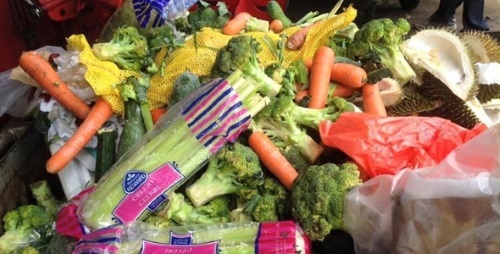Majority of consumers are concerned about food waste generated by food and beverage (F&B) companies and would encourage and support the companies to reduce food waste, according to a recent survey conducted from February to April 2015 by the students under the Chua Thian Poh Community Leadership Programme from the National University of Singapore, in partnership with non-profit organization, Zero Waste SG.
According to the National Environment Agency, about 790,000 tons of food waste was generated in Singapore in 2014.
About 13% of this waste is recycled.
Consumers can reduce food waste and advocate for greater efforts and best practices in food waste reduction by the F&B sector.
With this premise, the study aims to understand consumers’ attitude towards food waste and how they hope F&B companies (including retail shops selling food; bakeries; cafes; restaurants; food courts; canteens; hawker centers; markets; supermarkets; and caterers) can contribute to the reduction of food waste.
The survey obtained 428 responses and found consumers are concerned about food waste and find it unacceptable for F&B companies to waste food.
About 90% of respondents are concerned about the food waste generated in Singapore and by F&B companies (agree or strongly agree).
More than 83% of respondents disagree or strongly disagree that it is acceptable for F&B companies to throw away unsold, excess and near-expiry food that is still safe for consumption.
Consumers want F&B companies to do more to reduce food waste and would encourage them to adopt food waste reduction strategies:
• 95% agree or strongly agree that F&B companies need to do more to reduce food waste.
• Most respondents would encourage F&B companies to adopt these food waste reduction strategies:
– Donate unsold, excess and near-expiry food that is still safe for consumption to charities (91%);
– Sell unsold, excess and near-expiry food that is still safe for consumption at a discount (84%).
About 82% of respondents would like to know what F&B companies are doing to reduce food wastage, and they would most like to know the food waste reduction strategy of these F&B companies (ranked according to the number of respondents who named the companies; the ranking does not indicate the amount of food waste from the companies):
1. NTUC FairPrice (200)
2. BreadTalk (159)
3. McDonald’s (112)
4. Cold Storage (95)
5. Giant (61)
6. Sheng Siong (58)
7. Kopitiam (38)
8. Starbucks (31)
9. KFC (27)
10. Four Leaves (23)
Close to 50% of the respondents named local supermarket chain NTUC FairPrice as a company whose food waste reduction strategy would be of interest to them.
The second most named company is bakery chain BreadTalk with 37% of the respondents, and the third company is McDonald’s (26%).
Respondents are most interested in how retail supermarkets reduce food waste, with supermarkets NTUC FairPrice, Cold Storage, Giant and Sheng Siong among the 10 most named companies.
Survey respondents said they are willing to support F&B companies that adopt strategies to reduce food waste by helping them spread the word for their efforts (81%).
In addition, 70% of respondents will buy more of the company’s food products or patronize the company’s outlets again, and 67% will continue to do so even if there are competitors.
If an F&B company donates unsold, excess and near expiry food to the charities and needy, the respondents will show support by telling others about the company’s efforts to reduce food waste (86%), or buy more of the company’s food products or patronize the company’s outlets again (70%).










